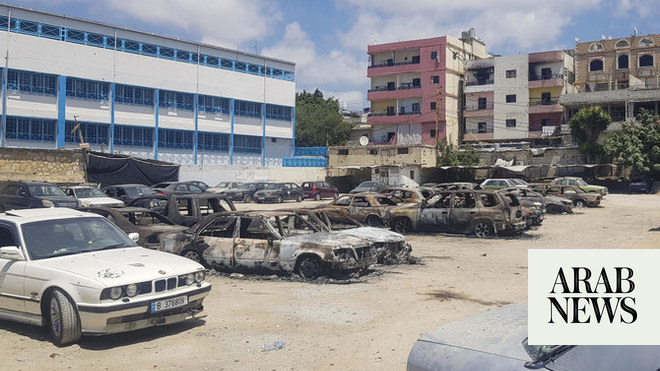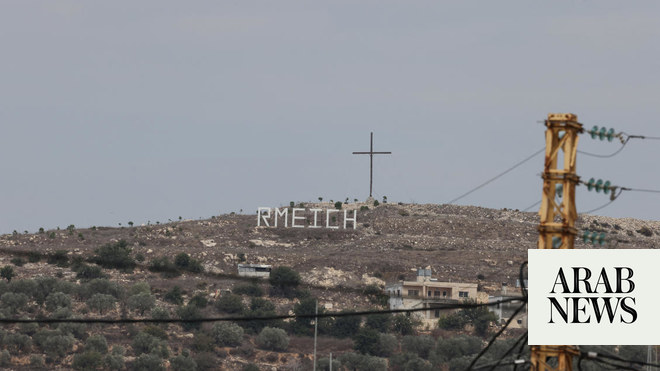
"We look forward to support from Arab states after US aid has stopped," says UNRWA’s Claudio Cordone
UNRWA has resorted to merging some classes and schools — a measure that did not affect students but is not sufficient to continue to fund their education
BEIRUT: Amira Maarouf, a 13-year-old student, hugged the books distributed to Palestinian students by the UN Relief and Works Agency for Palestine Refugees in the Near East (UNRWA) at the start of the new school year.
Amira, a student at Haifa School in Bir Hassan in the suburbs of southern Beirut, said: “We want to study. No one can deny us our right to education. This is a child’s right that we learned about at school.”
Amira knows that the US has ended its funding for UNRWA, and that the UN agency for Palestinian refugees will be unable to continue providing Palestinian children with education next October due to budget deficits.
“The US decision may cancel our education but it cannot cancel Palestine. Palestine is my home, and if these schools stop operating, I will go to Lebanese schools,” she said.
The number of Palestinian students in Lebanon receiving education in UNRWA schools is 37,000, including 5,500 Palestinian students who have fled the war in Syria.
Salem Dib, UNRWA’s chief education program officer in Lebanon, told Arab News during a ceremony held by UNRWA to launch the school year: “UNRWA Commissioner-General Pierre Krähenbühl insisted on starting the school year on time to stress the students’ right to education, which is also one of the Rights of the Child, adopted by the UN and it is a concern for the international community.
“There are 560,000 Palestinian students in Arab countries studying in UNRWA schools, and we know that the money available for operating schools is sufficient until the end of September. We face great concern in October, and we will work tirelessly to protect the rights of those children because their education means their right to dignity.”
Dib said that UNRWA has resorted to merging some classes and schools — a measure that did not affect students but is not sufficient to continue to fund their education.
He added: “There are 66 UNRWA schools in Lebanon, most of which are in the 12 Palestinian refugee camps across Lebanon and also in areas populated by Palestinians outside camps. These schools provide primary to secondary education.”
Dib said that the US supplied nearly 25 percent of the total budget of UNRWA, and the US has only paid $60 million of its $360 million share, leaving UNRWA with a deficit of $217 million.
The director of UNRWA affairs in Lebanon, Claudio Cordone, told Arab News that the agency needed $217 million to cover UNRWA’s needs until the end of this year, in addition to increased efforts to secure funding for 2019.
He said: “We are working with Arab states, specifically with Saudi Arabia and the UAE, and traditional donor countries, like the EU and others, to contribute and cover the deficit.
“UNRWA is in direct contact with all countries, and we will attend the Arab League’s meeting next week. Moreover, during the UN General Assembly, which is to be held in New York at the end of this month, we will hold meetings with donor countries.”
Cordone said that UNRWA had no association with political affairs and denied the US “argument” about “irreparable defects,” stressing that UNRWA “is a humanitarian services agency that has been helping Palestinian refugees for decades.”
He played down the importance of fears of naturalizing Palestinians and said: “We aim to continue to assist the Lebanese state until the Palestinian refugee crisis is resolved.”
Former Lebanese minister Hassan Mneimneh, chairman of the Lebanese Palestinian Dialogue Committee, stressed that the only ones who have the right to cancel or keep UNRWA are the Palestinians.
He said: “UNRWA will stay as long as the Palestinian issue remains unresolved.”
He described the US decision as “primarily political” and said: “This decision implements a plan the US administration refers to as a political settlement which we believe to be a political cancelation of the Palestinian issue.”
He added: “Weakening UNRWA to impose a fait accompli is not possible, and we will face this by seeking funding from rich countries.
“In Lebanon, we must engage in political and diplomatic campaigns to encourage other countries to support UNRWA.”
The ceremony, which included releasing blue and white balloons into the sky by the students of Haifa school, was met with appreciation by the Palestinian ambassador to Lebanon, Ashraf Dabbour.
He said: “I am grateful to UNRWA for providing its services to the Palestinian people to ensure they live in dignity, which is as priceless as homelands.”
Meanwhile, Amira knows the books that she hugs are not new but are passed on by students every year. She knows she will find torn pages, but she doesn’t mind. She is one of the students who have been elected to represent their sections in the school’s student parliament, which explores the school’s needs.
She said: “I will not tell you about the many problems at my school, but the most urgent of them is the bathrooms’ problem.”
At the ceremony, 10-year-old Rawan Ismail walked with a wooden leg, accompanied by Ayman Al-Amin, a graduate of the Galilee School, which is adjacent to the Haifa School.
Rawan’s mother said that her daughter was suffering from a disability in her spine that was putting pressure on her heart, as well as a disability in her leg which required her to undergo two surgeries, including the amputation of one of her legs.
Ayman explained that he stayed by her side during her last surgery, which was paid for by UNRWA and a Palestinian NGO.
He declaimed to the school’s audience: “O conscience of the world, hear the cry of my exhausted people … their cry is from the heart and appeals to humans … their natural right is to education, health, and to live as humans.”












